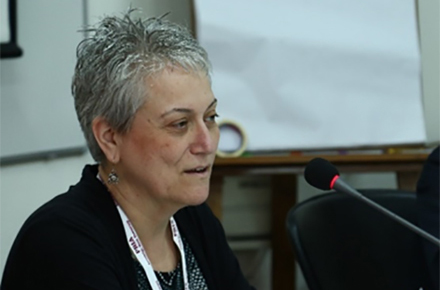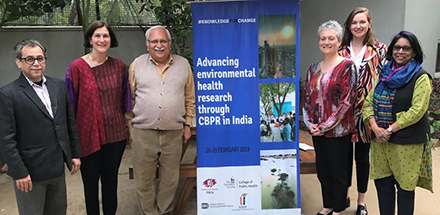NIEHS Joins Experts in India and Thailand to Discuss Collaborative Approaches to Environmental Health Issues
[ad_1]
U.S. and Indian Workshop Participants Explore CBPR
By Elizabeth Witherspoon, Ph.D.
U.S. and Indian researchers and Indian public health practitioners gathered to share best methods and practices for community-based participatory research (CBPR) at a workshop in New Delhi, India, on February 26 – 28. The workshop, “Advancing Environmental Health Research through CBPR in India,” addressed three key needs identified by Indian participants: health impacts of pesticide exposures, natural disasters and their environmental consequences, and air pollution—both ambient and household.
Kaustuv Bandyopadhyay, PRIA; Parker, University of Iowa; Tandon, PRIA; Collman, NIEHS; Nicole Novack, University of Iowa; and Sen, PRIA.
(Photo courtesy of PRIA)
Gwen Collman, Ph.D., director of the NIEHS Division of Extramural Research and Training and a co-organizer of the workshop, led a delegation of seven American researchers to share U.S. case studies in these three areas alongside their Indian counterparts, who presented case studies from India. Through the presentations, panel discussions, and hands-on activities, participants laid the groundwork for building capacity and future Indo-U.S. collaborations to engage communities in research to reduce health impacts across all areas of environmental health research. In all, 19 Indian academics and researchers and 22 Indian practitioners shared the details of methodologies and best practices for conducting CBPR with the U.S. researchers.
NIEHS is a strong proponent of involving members of communities impacted by environmental health issues in every step of research—from identifying needs and designing studies through data collection, analysis, and translation of findings into concrete policies and practices to improve health. Involving community members in this way ensures that environmental health research is most relevant to and effective for those impacted by the issues under study.
“I was delighted to see the depth of discussion on practical steps necessary in using CBPR to address key environmental health challenges in India,” said Rajesh Tandon, Ph.D., founder-president of Participatory Research in Asia (PRIA) and a co-organizer of the workshop.

Collman speaks to workshop participants.
(Photo courtesy of PRIA)
“The University of Iowa College of Public Health and PRIA were amazing partners. They brought a lot of expertise to the table. It culminated with a great group of participants who really rolled up their sleeves. They were anxious to learn. They were anxious to share their experiences. They were really engaged in the case study conversations that we had,” said Collman. Edith Parker, Dr.P.H., dean of the University of Iowa College of Public Health and member of the NIEHS National Advisory Environmental Health Sciences Council, was a co-organizer.
A highlight of the workshop was a demonstration of a new technology to aid in data collection for CBPR studies assessing exposure. Silicone wristbands worn by study participants can collect samples of airborne chemicals. The wristbands are then analyzed in the lab and levels of exposure are detected for many chemicals. Workshop participants discussed at length how to use this technology with community participants in research.
The workshop segued into a public event on the third day, “Know Your Exposures, Know Their Impacts: Citizen Engagement in Environmental Health Research,” hosted by the American Centre at the U.S. Embassy. Preetha Rajaraman, Ph.D., the health attaché at the U.S. Embassy, moderated the panel discussion. Banalata Sen, Ph.D., an independent Indian researcher who previously worked at NIEHS and a co-organizer of the workshop, described the outcomes of the workshop.
Parker explained that Sen and Collman conceived the idea for the workshop and then asked Tandon and her to co-chair it. Parker and Tandon are international experts in using diverse methodologies to engage citizens in a wide range of communities in public health and civil discourse. They sought and received funding from the Indo-U.S. Science Technology Forum for workshop logistics and travel for Indian participants, and from NIEHS for travel expenses of the U.S. delegation.
“The workshop exceeded my expectations, which where high to begin with,” said Parker. “PRIA was an excellent partner and they were able to identify and invite many excellent Indian researchers, funders, and community groups as presenters and participants. Also, I think our U.S.-based presenters did a great job of presenting their research in a very accessible fashion to all parts of the audience.”
As for next steps, Collman, Tandon, and Parker all agreed that this workshop jumpstarted plans for future Indo-U.S. collaborations in environmental health. In fact, Parker said that she and Tandon are now discussing a potential project together. In addition, Tandon said that PRIA will be sharing the workshop proceedings extensively.
Expanding the Environment for One Health in Southeast Asia
By Brittney Baumert
In February, NIEHS staff participated in the 4th International Conference on One Medicine One Science (iCOMOS 2019) in Chiang Mai, Thailand. The conference, partially supported by the NIEHS-World Health Organization Collaborating Centre, brought together nearly 400 experts and students from 35 countries to explore One Health solutions to a range of global environmental health problems, such as chemical exposures in pesticides, air pollution, and extreme weather events.
As part of the event, NIEHS Health Science Policy Analyst Kimberly Thigpen Tart, J.D., M.P.H., and NIEHS Senior Medical Advisor Aubrey Miller, M.D., organized and conducted a session on the Disaster Research Response (DR2) program, which employs a One Health approach to investigating disaster-related exposures to inform response, recovery, and preparedness. The session included five case studies of disaster scenarios and resulting health issues endemic to Thailand, coupled with relevant DR2 tools and resources that might be applied to each scenario, and a discussion of disaster research needs, priorities, and opportunities in Southeast Asia.
Miller presented the goals of the DR2 program and shared lessons learned during the development of DR2 and its subsequent expansion as a model to other countries, including Japan and Canada. He stated that multistakeholder collaboration is not only possible, but is critically important to successful disaster response, and emphasized the importance of leveraging prior work and relationships for new studies. “Sharing information and understanding what people have done in response to a disaster is key,” said Miller. “By getting people to talk at the community level, having systems in place, and knowing what resources are available, the response time to a disaster will be much shorter and efforts will be more seamless.”
Chiang Mai University (CMU) computer scientist Paskorn Champrasert, Ph.D., provided a compelling presentation of his grassroots approach to addressing the annual flooding disasters in Northern Thailand. Champrasert developed a technologically advanced floodwater monitoring and early warning system, and then engaged community members in the villages of Chiang Rai and Phayo directly in its operation and maintenance. “It is important to teach the villages how to maintain their monitors—the villages must have buy-in,” said Champrasert. Each village has a system of river monitors linked to a website that uses a color-coded system to indicate water level and flood risks, making the data accessible to and interpretable by the community. Champrasert’s work in establishing a network of data collection tools and integrating disaster preparedness with effective risk communication embodies the goals of the DR2 program.
Kulvadee Thongpibul, J.D., Psy.D., a clinical psychologist at CMU, presented some of the challenges of integrating mental health response with disaster response in Thailand, including the limited capacity of prevention and promotion programs, the lack of integration of mental health into primary care, and inadequate deployment of mental health services to post-disaster communities. While earning her doctoral degree, Thongpibul contributed to the development of the Disaster Psychosocial Assessment and Surveillance Toolkit (DISASTER-PAST), which is available on the DR2 website. Thongpibul emphasized the need to eliminate the stigma surrounding mental health and the importance of education in changing cultural understandings of mental health.
The session ended with a spirited discussion on ways to create communication and integrate knowledge across disciplines, which is central to the One Health initiative.
iCOMOS 2019 was hosted by CMU and the University of Minnesota. NIEHS has partnered with iCOMOS since 2015 to help integrate environmental health into the conference.
[ad_2]


